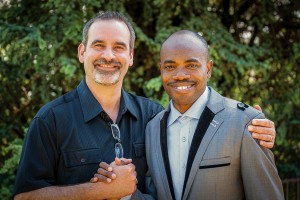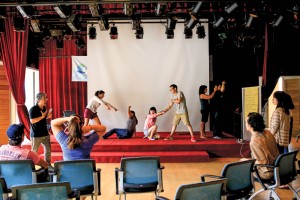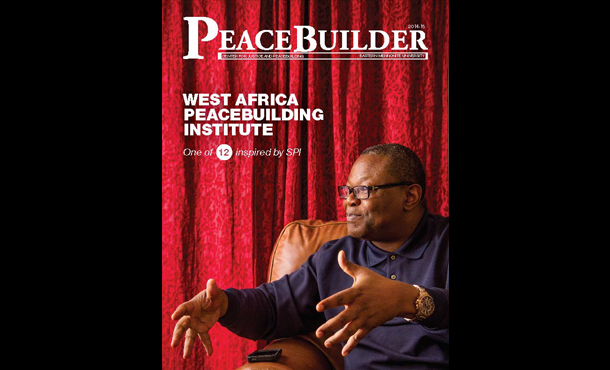How can the peacebuilding philosophy shared and taught at Eastern Mennonite University’s Center for Justice and Peacebuilding (CJP) become more globally recognized?
How can CJP expand its impact in the world?
These simple, yet profound questions asked by CJP donors James and Marian Payne more than two years ago eventually led to the production of the latest double-sized issue of Peacebuilder.
This special edition explores the impact of initiatives that have emerged from EMU’s Summer Peacebuilding Institute.
The Paynes provided the funds for EMU communications staff to travel around the world to learn about the successes and struggles of educational initiatives run by CJP-linked peacebuilders. Magazine founder and editor Bonnie Price Lofton, who has since retired, was the primary writer, contributing most of the content after two mammoth journeys to three continents in the fall and winter of 2014-2015.
The ripple effects of these peacebuilding initiatives are nothing short of amazing, writes CJP Executive Director J. Daryl Byler in his introduction to the issue.
“And yet many of them wrestle with the same issues we face at CJP. How can peacebuilding organizations be financially viable for the long term, while remaining accessible to all who wish to expand their peacebuilding knowledge and skills? How do these centers continue to engage with their alumni in ways that are mutually beneficial? The peacebuilding field – and the funders and advocates who want it to succeed – have much to learn from these stories.”

The featured initiatives are:
- Bridgebuilders – founded January 1996 – headquartered in London, serving churches throughout the United Kingdom;
- Justapaz – fall of 1996 – headquartered in Mozambique, mainly serving that country, yet also hosting participants from other Portuguese-speaking countries;
- West African Network for Peacebuilding (WANEP) – 1998 – headquartered in Accra, Ghana, with staff working in 15 African countries;
- Henry Martyn Institute’s (HMI) peacebuilder training program – 1999-‘00 –headquartered in Hydrabad, India, but serving all of India, with a special focus on ethnic minority regions in the far northeast of India;
- Africa Peacebuilding Institute (API) – 2000 – headquartered in Johannesburg, South Africa (originally in Kitwe, Zambia), serving all of Africa, but particularly southern and eastern;
- Mindanao Peacebuilding Institute (MPI) – 2000 – headquartered in Davao, Philippines, attracting participants widely, but especially serving southeast Asia;
- The Peacebuilding and Development Institute at American University – summer of 2001 (ceased operation after 2013 summer session, due to decision by university administrators) – Washington D.C.;
- JustPeace Initiatives – 2005 – headquartered in Peshawar, Pakistan, serving all of Pakistan, with a particular focus on the northwest region where violent conflicts have a regional impact extending into Afghanistan;
- The Peace Academy in Sarajevo – 2007 – based in Sarajevo, Bosnia-Herzogovina (has not offered intensive trainings since 2012, but hopes are for resumption in 2016), serving post-Yugoslavia populations emerging from violent conflict;
- Pacific Centre for Peacebuilding – 2007 – headquartered in Suva, Fiji, but with wide focus on all South Pacific islands;

The enactment of scenarios is often part of the experiential training of peacebuilders, as seen at this 2013 session of the Northeast Asia Regional Peacebuilding Institute. - Northeast Asia Regional Peacebuilding Institute – 2008 (a sister group, the Korea Peacebuilding Institute, emerged in 2012) – headquartered in Seoul, South Korea, but with summer peacebuilding sessions that rotate among South Korea, Japan, China, and Mongolia;
- Canadian School for Peacebuilding – 2009 – in Winnipeg, Canada, attracting participants widely, but especially serving western Canada.
Additional articles feature lessons learned and implemented from the first and only group gathering in 2004 of peacebuilding institute leaders and a thematic exploration of “calls to action” gleaned from the featured institutes.
The issues profiles many CJP alumni, whose professional information can be found on CJP’s website.
